Ringquisition — our little segment that takes a slice of The Rings of Power and puts it under the microscope — returns. One this occasion yours truly (Staffer Demosthenes) and TORn Discord Moderator DrNosy turn the lens on the goings-on of the Noldor in the opening two episodes of The Rings of Power.
Editor’s note: this is an edited summary of a live discussion hosted last weekend on our Discord.
Is there truly no evil in the beginning?
DrNosy muses…
Let’s consider Galadriel’s statement that opens the series and its context.
`Nothing is evil in the beginning. And there was time when the world was so young there had not yet been a sunrise. But even then there was light.`
Galadriel, The Rings of Power: S1.E1
A few key observations upon this theme:
A young Galadriel sets sail to an origami Swan Boat in Valinor. This opening scene foreshadows the journey of the Elves from Aman (Valinor) to Middle-earth in the Swan Boats of the Teleri, which were subsequently destroyed.
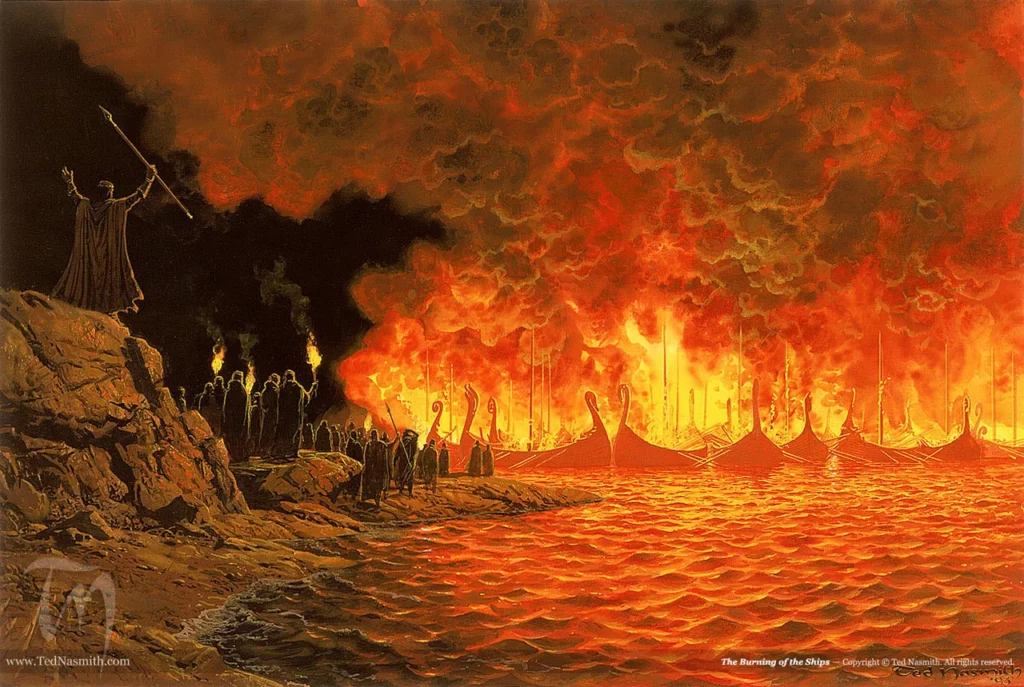
Even in paradise (Valinor), there is discord amongst the children (the innocent) — is there truly no evil in the beginning? This concept is an undercurrent in Tolkienian writings. Arda had been marred by evil (by the actions of Melkor, also named Morgoth (‘Black Foe of the World’) after Manwë cursed him) even before the awakening of the Children of Illuvatar.
The strife among the Elven children is a reminder that ‘evil’ is an inherent aspect of the Children. Therefore, Illuvatar’s decree of the fate of Men and Elves (the acceptance of death and facing the judgment of Mandos) is a personal and spiritual decision made by nearly every character in Arda. (Of the Beginning of Days, The Silmarillion)
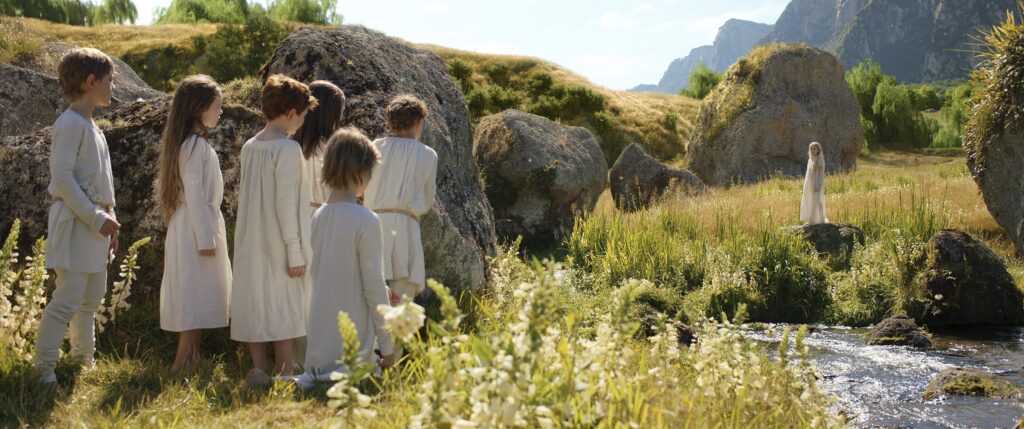
Another place this appears is in her dialogue with Elrond:
And in the West, do you think my fate would be better? Where song would mock the cries of battle in my ears? You say I have won victory over all the horrors of Middle-earth. Yet you would leave them alive in me? To take with me? Undying, unchanging, unbreaking, into the land of winterless spring?
Galadriel, The Rings of Power: S1.E1
This dialogue implies that if Galadriel returns to the Far West, the evil within her will live on forever. Yet I feel this dialogue is a slight oversimplification in light of Tolkien’s texts. Specifically:
- Death was a concept that existed from before the arrival of the Children of Illuvatar. The Elves are immortal, but this does not mean they are eternal beings (`Of the Beginning of Days`, The Silmarillion).
- Fading, for the Elves, is a process that occurs slowly in Aman, and rapidly in Middle-earth (‘Difficulties in Chronology’, The Nature of Middle-earth). The purpose of the Elven rings (`artificer`) was to slow the effects of fading on Middle-earth.
- Galadriel, as a bearer of such a ring, is protector of Lothlórien and her continued presence on Middle-earth also meant her inability to accept death and accumulate power to help resist the fading.
- With this perspective, it is interesting to read these words from The Fellowship of the Ring: ‘I pass the test,’ she said. ‘I will diminish, and go into the West, and remain Galadriel.’ (The Mirror of Galadriel’, The Lord of the Rings).
Why does Finrod make a vow to pursue Sauron?
Demosthenes explores…
In The Silmarillion, Finrod does make an oath — and remember that oaths are not lightly sworn in the “Tolkienverse”! — but it’s an oath to Barahir. Barahir, of course, saves him from an evil fate during The Battle of Sudden Flame.
Thus Felagund escaped, and returned to his deep fortress of Nargothrond; but he swore an oath of abiding friendship and aid in every need to Barahir and all his kin, and in token of his vow he gave to Barahir his ring. Barahir was now by right lord of the house of Bëor, and he returned to Dorthonion; but most of his people fled from their homes and took refuge in the fastness of Hithlum.
Of the Ruin of Beleriand and the Fall of Fingolfin, The Silmarillion
In the Episode 1 prologue, Galadriel’s voice-over tells us that “My brother vowed to seek [Sauron] out and destroy him.” The conflation of dialogue and visuals suggests that’s what we’re seeing in this particular flashback. That — despite superficial appearances — it’s not the Oath of Feanor made in Tirion (as Finrod takes no part in that). Instead, it’s something else; somewhere else.
What might fit is a rough adaptation of Finrod making good on his promise to Barahir. Yet, frankly, this is still not a vow to pursue Sauron. Not even close!
Felagund seeing that he was forsaken took from his head the silver crown of Nargothrond and cast it at his feet, saying: ‘Your oaths of faith to me you may break, but I must hold my bond. Yet if there be any on whom the shadow of out curse has not yet fallen, I should find at least a few to follow me, and should not go hence as a beggar that is thrust from the gates.’ There were ten that stood by him; and the chief of them, who was named Edrahil, stooping lifted the crown and asked that it be given to a steward until Felagund’s return. ‘for you remain my king, and theirs,’ he said, ‘whatever betide.’
Of Beren and Luthien, The Silmarillion
The other point of contention around this whole vows affair, I think, is the choice of the showrunners for Galadriel to take it up. I would ask: is our book-driven understanding that she is the sort of person to take oaths? I think that this suggests no:
Galadriel, the only woman of the Noldor to stand that day tall and valiant among the contending princes, was eager to be gone. No oaths she swore, but the words of Fëanor concerning Middle-earth had kindled in her heart…
Of the Flight of the Noldor, The Silmarillion
Is Galadriel deceiving us by saying it’s a vow? Is she deceiving herself? Is she reliable on this point? I think that Halbrand says something very interesting — and, potentially, very insightful, on the matter:
If you want to murder orcs to settle a score, that’s your affair. But don’t dress it up as heroism.
Halbrand, The Rings of Power: S1.E2.
A simple vendetta isn’t an oath in Middle-earth.
Why did the showrunners make Galadriel Commander of the Northern Armies?
Demosthenes observes…
There’s an interesting section of the History of Galadriel and Celeborn that outlines one scenario for Galadriel’s story. Simply titled “Concerning Galadriel and Celeborn”, it describes how they “did not go West at the Downfall of Melkor, but crossed Ered Lindon… into Eriador … and for a while dwelt in the country about Lake Nenuial (Evendim, north of the Shire)”.
Galadriel as Commander of the Northern Armies, might be an instance of the showrunners cribbing from that concept. She doesn’t merely lead the army (comprised, seemingly, of nine fellow-Noldor). Instead, she serves as a protector for that entire northern area of Eriador. Of course, it also serves as natural way to push her north into Forodwaith on the great Sauron-hunt. It’s her patch; she’s taking care of it.
It also provides an opportunity to evoke a short, but gripping, scene from The Silmarillion (I ask that readers excuse my rather inferior screencap).
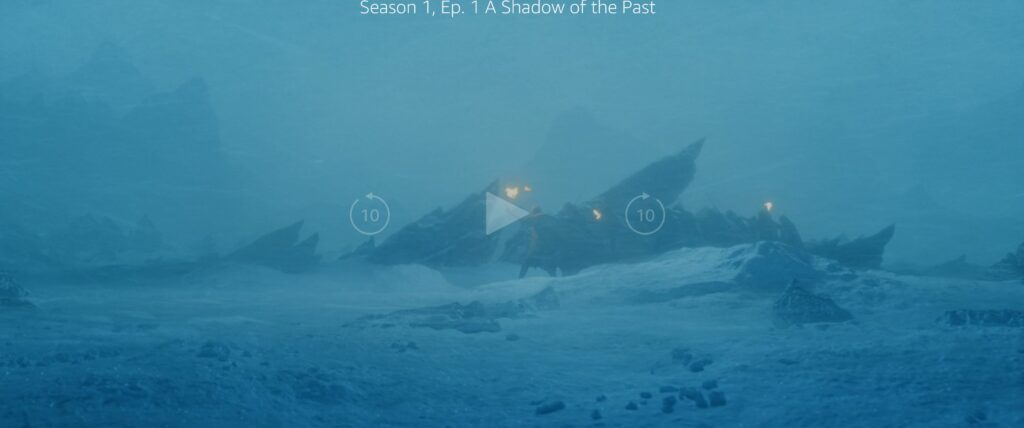
We’re crossing the grinding ice. In miniature. I think that’s pretty neat. (Aside: Nasmith is underappreciated as a Tolkien artist.)
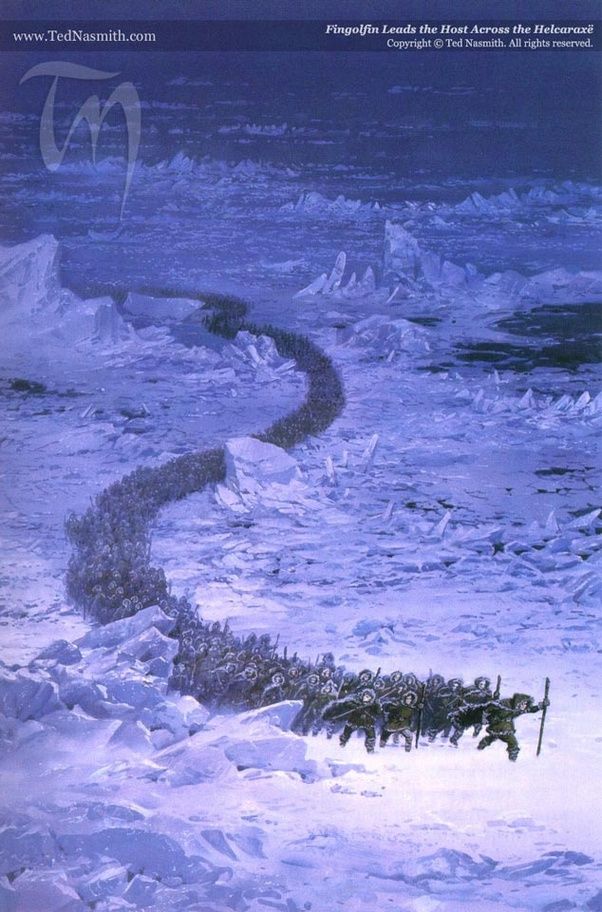
The crossing of the Grinding Ice by the Noldor was a rough trip! But The Silmarillion also dispenses with this arduous journey in little more than a paragraph.
The fire of their hearts was young, and led by Fingolfin and his sons, and by Finrod and Galadriel, they dared to pass into the bitterest North; and finding no other way they endured at last the terror of the Helcaraxë and the cruel hills of ice. Few of the deeds of the Noldor thereafter surpassed that desperate crossing in hardihood or woe. There Elenwë the wife of Turgon was lost, and many others perished also…
Of the Flight of the Noldor, The Silmarillion
Galadriel’s journey’s end-point in The Rings of Power is undoubtedly less hospitable than that of the crossing of the Grinding Ice. But at least she has a map to point the way this time!
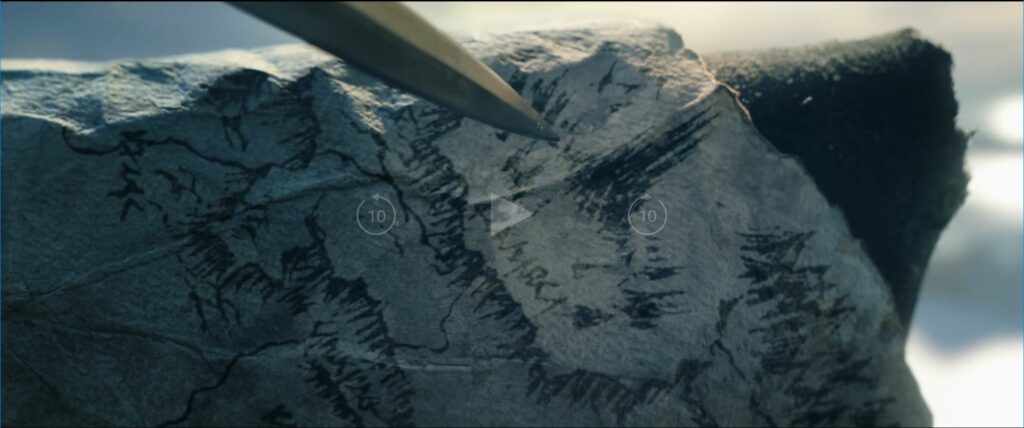
And it’s bloody cold! Why? Utumno’s ruins are basically here (probably under the ice-bay of Forochel though there is plenty of debate on that matter) and they continue to exert a localised chilling effect on the climate.
Finally, that mountainous location from the trailer — it’s not Thangorodrim after all. It’s just an evil Disney castle. Bit of a disappointment — who wouldn’t have wanted to see a visualisation of The War of Wrath?
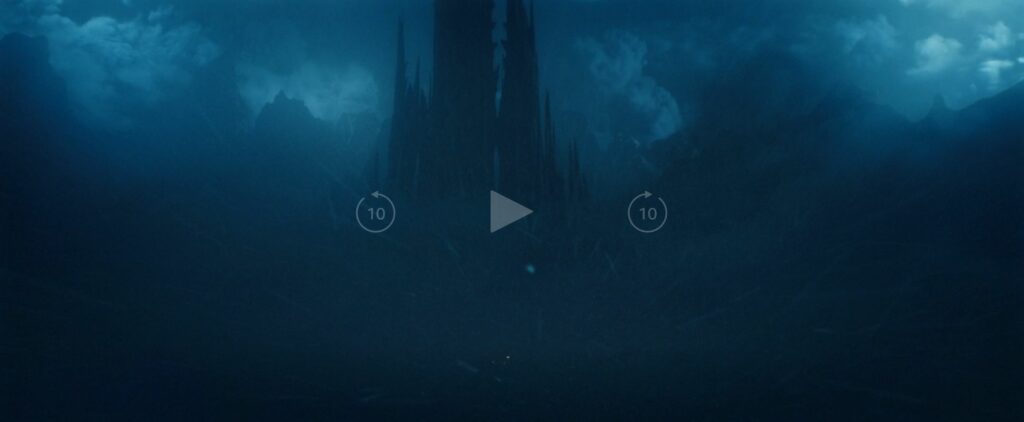
What did the elves (other than Galadriel) think had actually happened to Sauron?
Demosthenes ponders the matter…
This is a key point, since the conflict about the fate of Sauron drives the story.
Galadriel believes he’s alive, out there and doing nefarious things. She states in Episode 1: “Evil does not sleep, Elrond. It waits.” That’s a definite crib from The New Shadow, by the way.
‘Deep indeed run the roots of Evil,’ said Borlas, ‘and the black sap is strong in them. . That tree will never be slain. Let men hew it as often as they may, it will thrust up shoots again as soon as they turn aside…’
The New Shadow, The History of Middle-earth
In fact, the attitude of Borlas is more or less Galadriel’s! That is, unceasing vigilance is required.
On the other hand, Elrond’s opinion is much more lackadaisical in The Rings of Power. He states that “The evil is gone”. This continues to puzzle me on a couple of counts.
Does he mean he believes Sauron is dead? That’s possible in the sense that a Maia can be completely and irrevocably severed from any physical form and unable to assume a bodily shape any longer. We see this both with Sauron and Saruman at the conclusion of The Lord of the Rings.
To the dismay of those that stood by, about the body of Saruman a grey mist gathered, and rising slowly to a great height like smoke from a fire, as a pale shrouded figure it loomed over the Hill. For a moment it wavered, looking to the West; but out of the West came a cold wind, and it bent away, and with a sigh dissolved into nothing.
The Scouring of the Shire, The Lord of the Rings
It seems likely that this was the fate of the Balrogs that Glorfindel and Ecthelion slew at the Fall of Gondolin.
Returning to The Rings of Power, if that had happened to Sauron you would think that such an event would be both marked and known? Or could it just be lost in the general chaos of the War of Wrath? I guess at least one Balrog escaped, so… perhaps.
Once the mark on the anvil at the Evil Disney Castle proves Sauron escaped and still exists in this, the Second Age, they (Elrond and Gil-galad) ought to be rethinking their assumptions. Elrond kinda pushes it with Gil-galad: “Then the shadow she sought… You believe it does exist?” But he also seems unwilling to be truly forceful about it!
What are the Elves up to?
DrNosy analyses…
Elrond: `Galadriel was so certain her search should continue.`
Gil-galad: `We foresaw that if it had, she might have inadvertently kept alive the very evil she sought to defeat. For the same wind that seeks to blow out a fire may also cause its spread.`
Elrond: `Then the shadow she sought, you believe it does exist.`
Gil-galad: `Set your mind at peace about it. What you did was right. For Galadriel and for Middle-earth.`
Elrond: `It is hard to see what is right. When friendship and duty are mingled.`
Gil-galad: `Such is the burden of those who lead and those who would seek to. Galadriel sails to the sunset. You and I must look to the new sunrise. To that end, are you acquainted with the work of Lord Celebrimbor?`
Elrond: `The greatest of the Elven-smiths, of course. I’ve admired his artistry since I was a child. Why do you ask?`
Gil-galad: `He is about to embark on a new project. One of singular importance. And we’ve decided that you will be working with him. But I’ll allow you to explain the details, Lord Celebrimbor.`
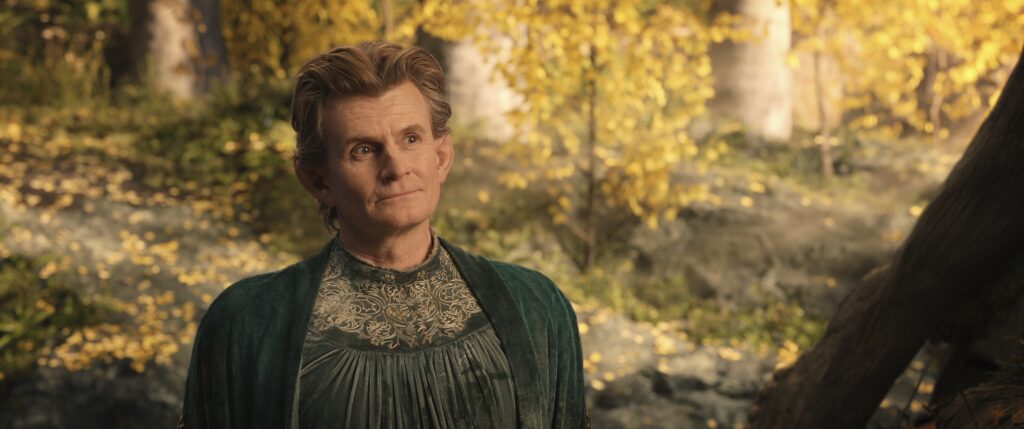
Reading into Gil-galad’s use of “we”, it appears that political decisions in Lindon often involves Gil-galad and a council of other Elven Lords of the realms. We are introduced to Lord Celebrimbor of Eregion. We are yet to be introduced to the other Elven Lords, most notably Círdan of the Grey Havens, Celeborn of Lothlórien (lore: Amdir/Amroth for Lorien), and Elvenking Thranduil of Mirkwood (lore: Oropher as King of the Woodland Realm).
Gil-galad is likely using “we” as a royal we’ but it doesn’t negate the point of an Elven council.
Gil-galad and the Council had determined that Galadriel’s concerns were accurate. Elrond is obviously unaware of the Council’s plans. It could be that the Council has determined that the solution isn’t pursuing an invisible enemy to banish evil.
Instead, it might involve the work of `artificers`, a concept that Arondir explains.
`Most wounds to our bodies heal of their own accord, so, it is their labor instead to render hidden truths as works of beauty. For beauty has great power to heal the soul.`
Arondir, The Rings of Power: S1.E1
Tolkien mentions the term ‘artificer’ in a letter to Milton Waldman.
But the chief artificer of the Elves (Fëanor) had imprisoned the Light of Valinor in the three supreme jewels, the Silmarilli, before the Trees were sullied or slain.
Letter #131, The Letters of J.R.R. Tolkien
Considering this show is about the Second Age, Celebrimbor, the greatest artificer of that Age, will play a significant role in the creation of the titular Rings of Power. It seems, therefore, that the tactic of pursuing war and battle with the enemy isn’t one that’s viable. Especially since Galadriel has now returned empty-handed from the last known stronghold of Sauron.
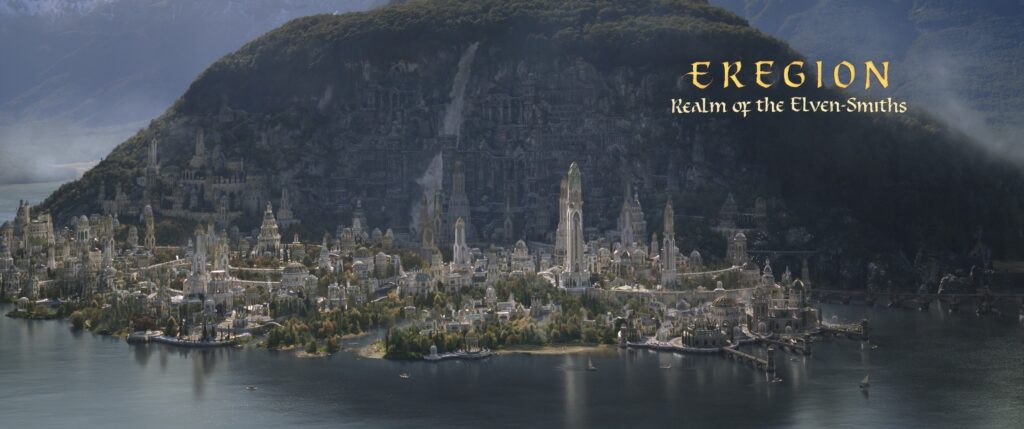
Consequently, the Elves are more interested in returning to their old ways of smithing and fashioning objects that create great beauty and help slow-down the effects of death and fading on Middle-earth itself. While the pursuit and creation of powerful objects imbue deathlessness into the world around them, it is simply that much evil can also result from things that have a `good root` (Letter #131).
We shall see what is ahead in future episodes.
Our chat participants
DrNosy is a scientist (physical science), scholar, and Tolkien enthusiast. Her primary interests lie in review and analysis of The Lord of the Rings: The Rings of Power. She is an active contributor and Moderator on TheOneRing.net Discord where she also hosts live open-forum panel discussions on The Rings of Power, The Silmarillion, and a variety of Tolkien-related topics. You can reach her on Twitter.
Staffer Demosthenes has been involved with TheOneRing.net since 2001, serving first as an Associate News Editor, then as Chief News Editor during the making of the Hobbit films. Now he focuses on features and analysis. The opinions in this article are his own and do not necessarily represent those of TheOneRing.net and other staff.


